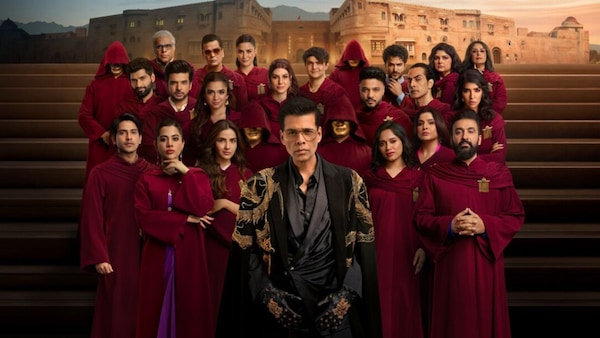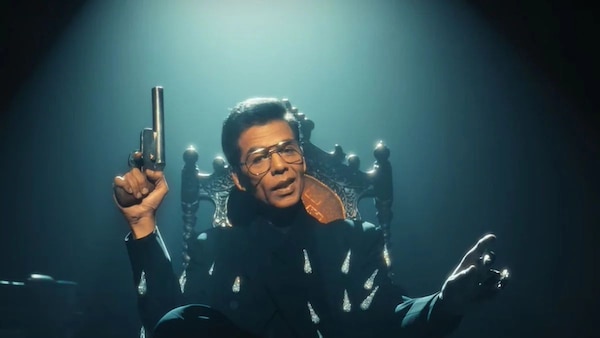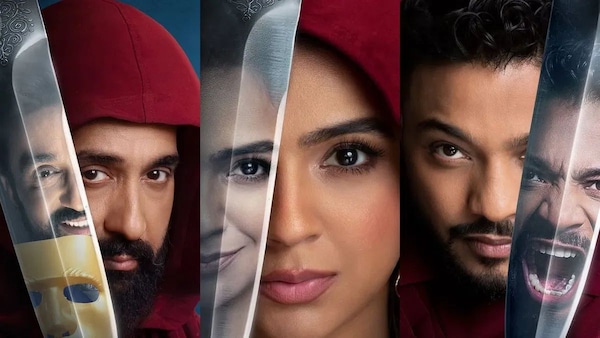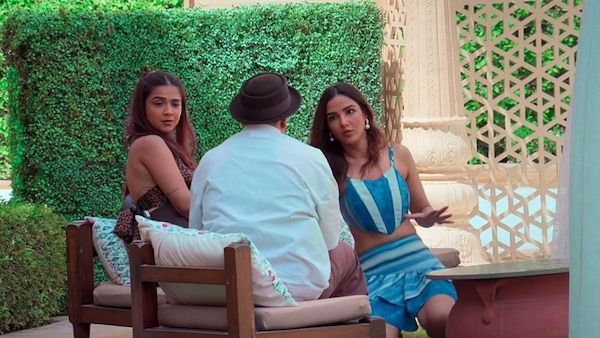Drama, Drapes & A Dose Of Karan Johar: The Traitors Is Peak Cringe-Binge
The Traitors forces you to question your own values: Do I want the good guys to win, or the clever ones? I know my answer, what’s yours?

Promo poster for The Traitors | Amazon Prime Video
Last Updated: 06.30 PM, Jun 16, 2025
A MURDER-MYSTERY-THEMED reality TV series, designed like the chit game we used to play as kids. A fight between Urfi Javed and Apoorva Makhija (The Rebel Kid) about who’s more relevant has already hit the news cycle. An auntie-niece combination that refuses to play with each other (Anshula and Maheep Kapoor). A few familiar faces from former Bigg Boss seasons (Karan Kundrra, Jasmin Bhasin, I see you). Karan Johar’s OTT wardrobe and facial expressions enmeshed to make for a snarky host — Amazon Prime Video’s new reality TV show The Traitors has everything you need to be hooked.
If one were to break this down from a TV critic perspective, The Traitors should not work. It’s a bunch of adults in cloaks skulking around a castle pretending to “murder” each other. You know who the Traitors are, you know the Innocents are going to be nauseously righteous. And yet, with every episode you watch, you get more addicted. This is not just because of the suspense or the over-the-top theatrics that seem to be a mandate for all versions of The Traitors. The series is addictive because it taps into a more primal part of your brain that lights up when someone smiles at you, and then stabs you in the back.

It’s a good thing Amazon Prime Video decided to go with weekly drops for the episodes, or else I wouldn’t be able to focus on anything else. With its dramatic twists, moody aesthetics, and intense mind games, the show has captivated audiences globally. Here’s the premise:
A group of contestants, usually a mix of reality-TV celebs and actors/artists, live together in a remote, grand location. In this case, they seem to be in one of Rajasthan’s royal castles. They need to complete missions and accumulate a prize pot of money. But among them are hiding “Traitors”, secretly selected at the start of the game, but audiences are in on this. The rest are “Innocents” who have to identify and banish the Traitors every episode via the "Circle of Shaq". Whichever group outpowers the other walks away with the prize money by the end.
Three episodes in, and it’s safe to say that the Indian version is a straight-up combination of Bigg Boss and Roadies. The scheming, manipulating, lying, plotting, making allies and betraying said allies — all come under the Bigg Boss umbrella. Every episode, teams have to complete missions that earn them money, which is where the Roadies flavour seeps in. At its core, The Traitors is like a video-game simulation of “how much can I trust you?” — trust, one of the oldest emotions in human evolution. In caveman times, misjudging who you trusted could get you eaten by a lion. On this show, it just gets you murdered at breakfast.

I already have my favourites, as I’m sure most of you have after watching the episodes. A sign of a successful TV series is one where audiences start having favourites right from the get-go. Mine are two polar opposites: there’s Apoorva Makhija, a sharp, observant and young contestant who reads the room well. She is always working to find out who the traitor is, and she talks to everyone, regardless of age or gender. She asks the right questions, and doesn’t give two sh*ts about what someone’s legacy is before entering The Traitors' castle. In their first Circle of Shaq, she nabs the first Traitor and convinces the whole group about it (spoiler alert: she’s absolutely bang on). Then, there’s Ashish Vidyarthi. A man who spent his whole career playing a villain, but here? He naps. He’s so blasé about his presence in the show, and rightfully so. According to him, people are going to judge and obsess over his moves, whether he’s a traitor or not, so he may as well chill. Honestly, goals.

The format is new, the faces familiar. There is intrigue, judgment and anticipation. The omnipresent cringe is cringing hard (a prerequisite for all reality TV shows). The contestants unravel with every episode. There’s much fun to be had even with a superficial viewing, but what makes The Traitors so psychologically juicy is how we all turn into judgy aunties as audiences. It’s the constant tension between who you are and who you want people to think you are. Whether it’s a Traitor putting on a show of grief, or an Innocent faking confidence, every moment is a performance.
And the real kicker? We’re rooting for the liars. It’s honestly hard not to; you can boo them as much as you like but the minute they pull off a deception out of the ordinary, you find yourself cheering for them. The Traitors forces you to question your own values: Do I want the good guys to win, or the clever ones? I know my answer, what’s yours?
